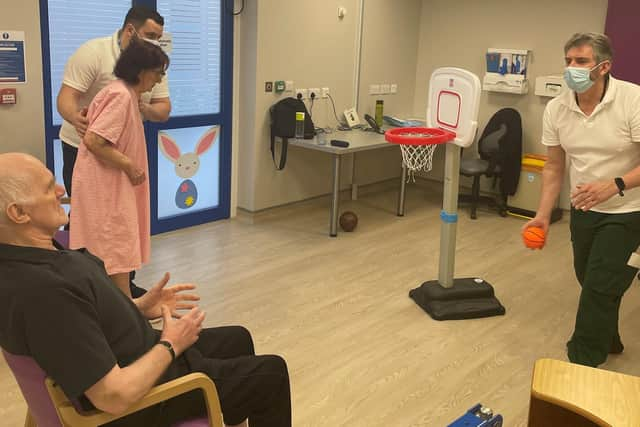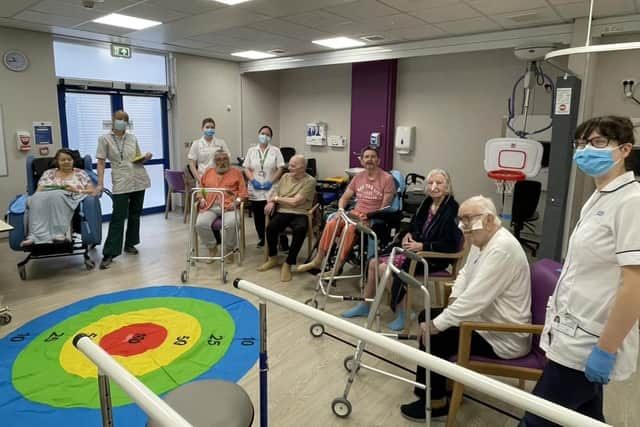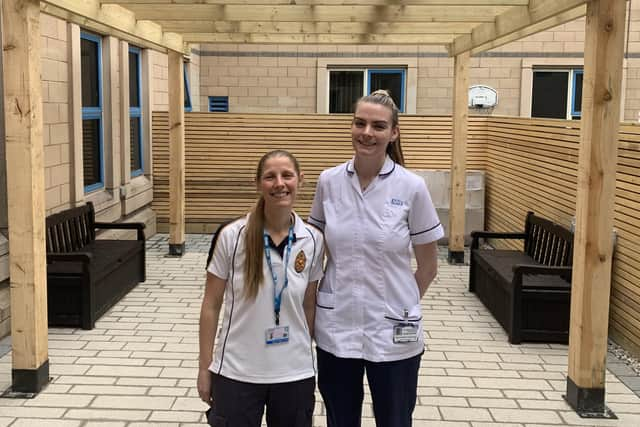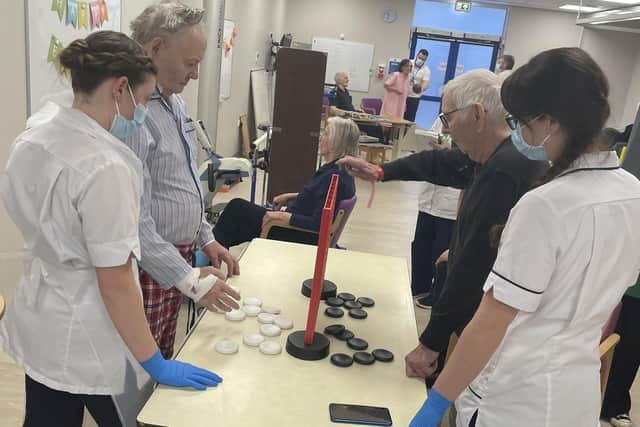And you are using the tyranny of low expectations to consider partial recovery good enough. DAMN IT ALL, 100% recovery is the only goal in stroke!
Patients’ lives transformed through new stroke rehabilitation and therapy space at Royal Lancaster Infirmary
A new stroke rehabilitation and therapy space is having a hugely positive impact on the care and recovery of patients at the Royal Lancaster Infirmay.
Patients have described the new facility as “absolutely fantastic” and “brilliant” because it offers an opportunity to regain their strength and mobility, to socialise with others and receive valuable support from highly skilled therapists.
Out of the devastation that a stroke can wreak, people can start to regain their strength, movement, independence and their lives in the Integrated Community Stroke Team's sensitively designed stroke rehab and therapy space.
Advertisement
Hide AdThe rehab and therapy space is located in the Huggett Suite in the Centenary Building at the Royal Lancaster Infirmary (RLI). With a bright and welcoming environment, the rehab and therapy space has the latest high-tech, bespoke gym equipment and a kitchen where patients can relax and make their own breakfast, if they wish.

The official opening of the new rehab and therapy space will take place on Thursday, and patients, carers, families, colleagues and other special guests are invited.
Colette Squirrell, Clinical Lead Physiotherapist for Stroke at the RLI, said: “We are so excited to be here in our new rehab and therapy space.
“It’s fantastic to have this new space to support the rehabilitation of our patients. The effects of a stroke can be huge and life-changing. We work out how the stroke has affected a person.
"There can be many different symptoms, depending on the part of the brain that is affected. This process can sometimes take a few weeks because there can be hidden effects of the stroke. This space is invaluable during that process.”

Tamsin Kind, Team Leader for Integrated Community Stroke team (RLI), said: “There is now space to have several of our patients in the space at one time and we have a very popular ‘Breakfast Club’ where patients can make their own breakfast.
“The lovely thing is that because we have several patients here at one time, it is sociable and friendly. Our patients can make themselves a cup of tea or some breakfast – it’s changing the mind-set of what happens in hospital.
“A stroke is such a shock to the system when this happens to someone. People can feel scared and low in mood, so it’s great to be able to come in here and be with other patients who are going through a similar experience.
“Patients have told us that it’s nice to see people doing what they were doing a few months ago. There is reassurance in seeing the progress that others have made during their recovery.

“From a therapy perspective, repetition after stroke is very important in the first months and we now have adequate space to enable patients to do that.”
The rehab space has machines with foot pedals similar to bikes and other gym-style equipment such as parallel bars and special hoists as well as tables where people can play boards games together, have something to eat or watch TV. The team often has activity sessions such as making cards and doing other crafts to celebrate special events.
Outside the unit there is a courtyard garden area that is being developed so that patients have somewhere to enjoy activities and relax on warmer days. The team hopes to have planters so that patients can try some gardening activities in the summer.
Colette said: “We are happy for carers to be involved and family members often come to the rehab space and join in.

“It enables families to see what level their loved one is at. If they haven’t been involved in the therapy, they won’t necessarily know what their loved one can do. It’s so much better and nicer being here than trying to provide therapy on a ward. It helps if we can have a chat with family members.”
The Integrated Community Stroke Team covers the trust’s hospital teams and community teams, and it operates a six-day service. It cares for up to 32 inpatients at a time and approximately 50 patients in the community, and has around 28 members of staff.
On a day-to-day basis there are around 15 members of staff in the new stroke rehab and therapy area at the RLI including physiotherapists, occupational therapists and speech and language therapists. In the Huggett Suite itself, there is a mix of acute and rehab beds.
Tamsin said: “We often work with patients for many months as the effects of a stroke can be life-changing. As we work with our patients for a long time, we often get to know them personally. It’s a real team effort and there is great camaraderie. There is great job satisfaction when people are able to return home. We want to give our patients the best possible opportunity to recover so the new space is fantastic.”
Yvonne Hastings, Clinical Service Manager for the Integrated Community Stroke teams cross bay, said: “We’re delighted with the new stroke rehab and therapy area at the RLI. It’s a great space for patients, carers and clinical staff. The Trust’s Capital Services and Estates Teams have done an excellent job in designing and finishing the therapy area to such a high standard.
“The new space enables us to provide therapy and other types of support for people in the early days of their recovery, right through to the point when they leave hospital and move back home with support. The therapy and skills provided in the new space are already helping people to gain independence and grow in confidence, which is wonderful to see.”
Colette added: “Going home can be a bit of a scary thought, but if we can help people to get into a more normal routine, that can give people confidence to be home again with their friends and family. We’re with people all of the way on their recovery journey. It’s a great feeling to see people back home and living their lives.”
No comments:
Post a Comment